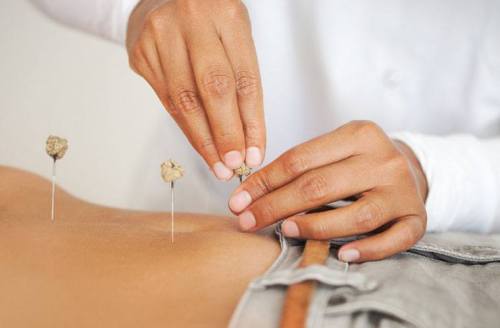Our editors independently select these products. Making a purchase through our links may earn Well+Good a commission
If you’re trying to get pregnant, you probably know how important it is to take care of your mind and body. That involves eating well, sleeping enough, being active, and, for a growing number of women, helping the body find its optimum energy balance through acupuncture. Jill Blakeway, DACM, a doctor of Chinese medicine, believes that acupuncture can create powerful changes—and that it may help boost your fertility, too. Curious? Here, the Well+Good Council member explains what you need to know.
Chinese medicine has been used to enhance fertility for thousands of years, but many people heard about the practice for the first time when Charlotte York went to see Dr. Mao on Sex and the City.
Here’s some insider intel: That character was played by the actor Hoon Lee, but the actual on-set acupuncturist was someone I know well: my husband (and fellow Chinese medicine practitioner) Noah Rubinstein. During the course of the shoot, he used more than 100 needles on poor Kristin Davis.
Fortunately, in real life, acupuncture is way more pleasant. Hair-thin, disposable needles are placed at 10 to 15 points on the body and left in place for 25 to 35 minutes. It feels kind of like plucking out an eyebrow hair—and once the needles are in, most patients say they feel no discomfort at all.
Acupuncture is a simple intervention with complex outcomes.
So how can it help with fertility? Acupuncture is a simple intervention with complex outcomes, because it supports the body’s self-healing mechanisms. By kicking the body into repair mode, it can affect hormone balance, nerve conduction, blood circulation, immune response, muscle tone, pain receptors, and the activity of neurotransmitters, which are the chemicals that carry signals from one part of the body to another.

Getting pregnant involves a chain of intricately timed processes, which is why restoring balance to the body can be such a big help. In the hands of an experienced fertility practitioner, needles can help increase blood supply to the pelvis and uterus to support a healthy egg as well as reduce inflammation to help with embryo implantation. There’s also research that shows acupuncture balances hormones and offsets the effect stress can have on reproductive hormones.
In an interesting twist, this ancient medicine can also help women undergoing decidedly modern fertility treatments such as in vitro fertilization (IVF) and intrauterine insemination (IUI). Many fertility experts with more traditionally Western backgrounds now fully embrace it.
Many fertility experts with more traditionally Western backgrounds now fully embrace acupuncture.
“I think acupuncture is a great way for a woman to manage stress during an IVF cycle,” says Alan Copperman, MD, the medical director at Reproductive Medicine Associates of New York and the vice chairman of the department of obstetrics, gynecology, and reproductive science at Icahn School of Medicine at Mount Sinai in New York City. “There’s also some evidence that it improves the outcome, too, so I’m all for my patients seeing a fertility acupuncturist during their treatment.”
That last finding comes from a 2002 study of 160 women that suggested adding acupuncture to traditional IVF treatments increased pregnancy success. A review of 1,231 IVF patients suggested that the benefits may be even greater if women combined Chinese herbs with acupuncture in the months leading up to IVF.
So if you’ve been trying to conceive without success, or even if you simply want to get in great reproductive shape before you start trying, it may be worth looking for your own real-life Dr. Mao.
Yes, just like Charlotte.
 Dr. Jill Blakeway, DACM, is a practitioner and teacher of Chinese Medicine and the founder and clinic director of the YinOva Center in New York City.
Dr. Jill Blakeway, DACM, is a practitioner and teacher of Chinese Medicine and the founder and clinic director of the YinOva Center in New York City.
Jill is the author of Making Babies: A Proven 3-Month Program for Maximum Fertility and Sex Again: Recharging Your Libido. She’s currently writing her third book, about energy healing, for Harper Collins.
What should Jill write about next? Send your questions and suggestions to [email protected].
Sign Up for Our Daily Newsletter
Get all the latest in wellness, trends, food, fitness, beauty, and more delivered right to your inbox.
Got it, you've been added to our email list.











